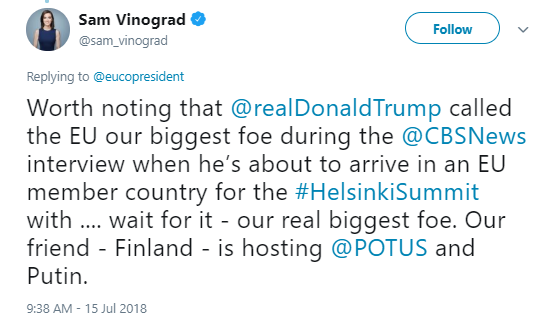U.S. President Donald Trump’s twisted worldview has real world consequences. Last week, he went overseas to attend a NATO summit, and while there, he continued on with antagonism of U.S. allies. He pushes them to need to spend more on their own defense now.
In an interview in the days following that summit, Trump went so far as to call the European Union his foe because of clashes he’s instigated over trade that they’re on the other side of.
https://www.youtube.com/watch?v=BrPmT0GcG-k
The burden of Trump’s remarks pushed German Foreign Minister Heiko Mass to respond this week, and his take on the path forward is grim.
‘We can no longer completely rely on the White House. To maintain our partnership with the USA we must readjust it. The first clear consequence can only be that we need to align ourselves even more closely in Europe. Europe must not let itself be divided however sharp the verbal attacks and absurd the tweets may be.’
European Council President Donald Tusk — a top E.U. official — offered his own thoughts on Trump’s comments, saying:
‘America and the EU are best friends. Whoever says we are foes is spreading fake news.’
In the post-World War II global policy environment, Germany is an ally of the United States — well, they’re supposed to be. Trump has sabotaged that relationship through means that his “foe” comment encapsulates, which he offered on the eve of meeting with none other than actual U.S. foe Russian President Vladimir Putin one-on-one.
His administration imposed steep tariffs on imported steel and aluminum from the E.U., adding a 25 percent import tax to the former and a 10 percent import tax to the latter product.
Those tariffs against the E.U. went into effect just within basically the last couple of months after having already been in effect against other countries for a couple of months. Also lumped in with the E.U. in this ordeal are U.S. allied countries like Canada and Mexico; those two nations and the E.U. have moved for retaliatory tariffs that have been felt in the American industrial landscape already. Companies like Harley Davidson and BMW have announced the transfer of some manufacturing overseas to get around the tariffs.
In the time since the imposition of those tariffs, Trump has attended both a G7 summit of world leaders and a NATO summit. In connection to both of those events, which in theory should be relatively uncontested meetings between allies, Trump has taken potshots at nations that have in the past worked to ally themselves with the U.S.
After leaving the G7 summit in Canada, for instance, he called Canadian Prime Minister Justin Trudeau “weak,” having been angered by his public comments against Trump’s tariffs.
In connection to the more recent NATO summit, Trump claimed Germany to be — of all things — in Russia’s pocket because of the trade they engage in with the country.
As the German foreign minister’s response to this antagonism shows, this rhetoric has consequences. Even if on a rhetorical level, the nations in question work to keep themselves allied with the U.S., on a practical level, things could need to change.
Featured Image via YouTube screenshot















